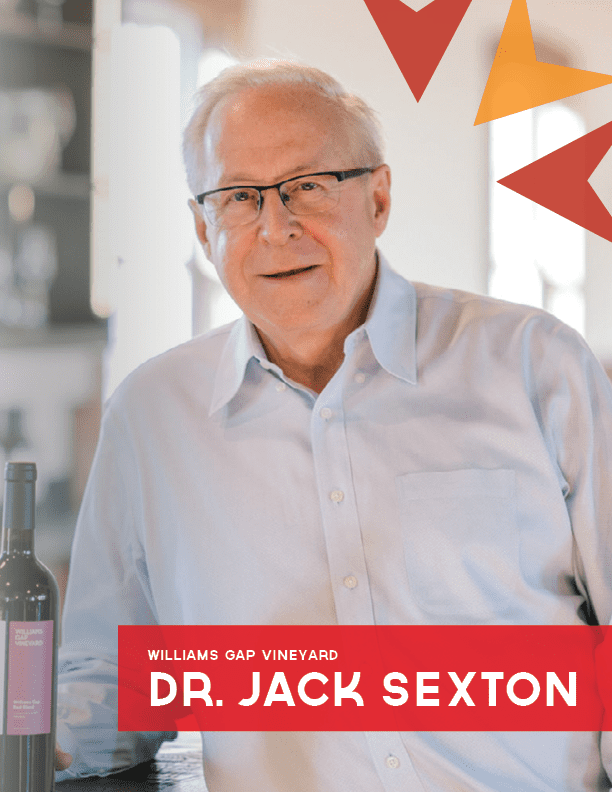Local Vineyard Grows With the Loudoun County Wine Industry
Williams Gap Vineyard is a family-owned vineyard located in Loudoun County. The scenic vineyard is nestled on 200 acres with expansive views of the Blue Ridge Mountains. Jack Sexton, Founder of Williams Gap Vineyard, has been a practicing veterinarian for over 45 years. What started as a grape-growing hobby has turned into a successful business venture that reflects the hard work and dedication of Dr. Sexton.
“We purchased some property in Loudoun County in 1983. The property was beautiful, but we didn’t do anything with it for a long time. I was always intrigued by agriculture and farming, and I wanted to explore that. I enrolled in some grape growing courses offered by the Virginia Cooperative Extension Service team, taught by people in Virginia, Pennsylvania and Maryland. Tony Wolf, a renowned viticulturist, was teaching some of the classes, and I became very interested,” said Dr. Sexton.
Dr. Sexton immersed himself in grapevine-cultivating education and attended local Loudoun Wineries and Winegrowers Association meetings to further connect with the industry.
“In 2005, I ordered 2,000 grapevines, and we planted them in 2006. I was doing all the work myself while still practicing veterinarian medicine, building deer fences and putting in posts. It was a major undertaking for me. In 2008, we harvested our first small crop and started selling grapes to a few local wineries,” said Dr. Sexton.
In the early 2000s, there were fewer wineries in Virginia than there are now, but according to Dr. Sexton, there was always a market for quality grapes. The region is now known as a premiere destination for wine lovers, with 50 wineries in Loudoun County alone. Williams Gap Vineyard has held its place as a quality grape, and now wine, purveyor for nearly two decades. “The land ended up being perfect for growing quality grapes. As we started selling our grapes, the whole thing took on a life of its own,” said Dr. Sexton.
Dr. Sexton quickly realized more equipment was needed to accomplish the manual labor required to cultivate grapes and that two acres of grapevines would not be enough to support the equipment investments they needed to make. “We planted more. Today, we have about 40 acres of grapevines and have acquired more property. It quickly evolved over the years into a much larger undertaking. We’ve developed a reputation for producing high-quality grapes that make fantastic wine. It requires a lot of time and effort to do that kind of craftsmanship,” he said.
Dr. Sexton has seen the demographics for wine change over the years. With Northern Virginia’s proximity to Washington D.C. and the international airport, he believes most people visiting the regional wineries are from the West Coast, nearby counties and D.C. metropolitan area. “The type of people that visit our winery have a good taste and appreciation for fine wine. 20-30 years ago, Virginia did not have a reputation for quality wine. Today, the quality is much, much higher, the standards are higher and the population that comprises the customer base is well-educated and has an affinity for choosing good wine,” said Dr. Sexton. “That’s been a change, and along with that change has been an increase in demand for vineyards that produce high-quality grapes.”
Dr. Sexton acknowledged that growing wine grapes is a labor-intensive industry that requires one to take many factors into consideration. From the inability to control the weather to dealing with pests and finding quality laborers to accomplish tasks within a limited timeframe. “Labor is a huge part of growing grapes, and over the years, there have been innovations in certain aspects of the growing process that reduce dependence on man-powered labor,” Dr. Sexton said. “You simply cannot put off tasks for two or three weeks because if you do that, things tend to fall apart or become more expensive to correct.”
The ability to tend to each important aspect of growing grapes is vital, and completing the tasks at the appropriate time in the growing season is crucial in creating a good product. Dr. Sexton shared how innovations in equipment and the mechanization of labor in the farming industry create a less hands-on approach to farming.
“Modern vineyards have narrow rows and require specialized tractors specifically set up for this. Disease, fungal and insect control in the vineyard require specialized equipment like a good quality sprayer that the tractor can pull. Vines grow and must be trimmed– We use hedging to control the amount of canopy and de-leafing to protect the grapes from crowding or too much shade and moisture. You can still do it by hand, but they now make machines that can hedge and de-leaf for you,” said Dr. Sexton.
Mechanizing these processes ultimately reduces time spent laboring and costs associated with hiring the labor out. “The biggest mechanical investment we’ve made was investing in a mechanical harvester,” said Dr. Sexton. “The innovation behind mechanical harvesters has improved dramatically over the years. We now have harvesters that are gentler and don’t risk damaging the fruit.”
A mechanical harvester can accomplish the work of 15 or 20 people, greatly reducing labor costs and saving time. It also allows the business to harvest any time of day. Dr. Sexton used an example of how temperature affects grape quality after the fruit is harvested. Harvesting grapes at two o’clock in the morning is preferable to harvesting them in the middle of the afternoon when most people are available to work. “It is only 68 degrees at two o’clock in the morning, and the grapes will keep well at this sustained temperature, producing a better quality juice when run through the press. If we harvest in the middle of the afternoon, it’s 95 degrees and the grapes won’t last as long,” said Dr. Sexton. Mechanizing the harvesting process gives Williams Gap Vineyard the luxury of accomplishing this important task at the optimal time.
“Farming has become so much more sophisticated. There’s a lot of science and technology involved in it, and I think the reason farmers in America have been so successful in terms of productivity is because of technology and innovation,” said Dr. Sexton.
Due to his success as a quality grape grower, Dr. Sexton decided to try fermenting his own wine in 2019. “We didn’t have a production facility yet, so we outsourced the wine production to one of our customers that performed custom crushes. We did this from 2019 to 2022. The wine was a success, so we decided to open a tasting room in 2021, and last year, we finished our own production facility on the property. It was the first year we made wine on-site,” said Dr. Sexton.
From two acres of grapevines to 40, Dr. Sexton’s hobby turned business venture has progressed remarkably well. “There’s no immediate return on investment when you do something like this. That develops over time; when you employ good people, you produce good wine. Those things have a value that people react positively to. They have to enjoy your product, your people and your facility,” said Dr. Sexton. “Being a veterinarian for 45 years, I’ve dealt with the public for a long time, and people have expectations. If they’re going to pay for a service or a product, they expect a good service or product in return. Being able to deliver that has much to do with how well you do business.”
Williams Gap Vineyard is currently growing six red vinifera varietals (Cabernet Franc, Merlot, Petit Verdot, Cabernet Sauvignon, Tannat and Syrah) and six white varietals (Chardonnay, Viognier, Vidal Blanc, Petit Manseng, Albariño and Sauvignon Blanc). The vineyard plans to continue to expand varieties as the market requires. The new winemaking facility on the property was finished in 2023. Williams Gap Vineyard now employs around 20 people, collectively, including a tasting room manager, tasting room staff, two full-time farm employees, a vineyard manager, and groups of laborers and part-time employees who come in to complete specific tasks as needed.
Loudoun Economic Development supports local wineries through education, marketing and grant programs. Williams Gap Vineyard applied for a grant with Loudoun Economic Development in recent years that was applied toward equipment and facility improvements at the vineyard. These community collaborations support local gems and family-owned businesses like Williams Gap Vineyard. Visit the Williams Gap Vineyard tasting room at 35521 Sexton Farm Lane, Round Hill, Virginia.
Publisher: Source link











